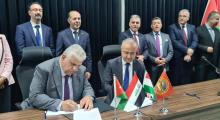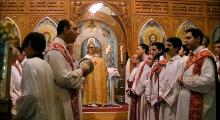Issued by the Catholic Center for Studies and Media - Jordan. Editor-in-chief Fr. Rif'at Bader - موقع أبونا abouna.org

Syria’s crisis seems to have no end. After 13 years, the war cannot be said to be over, while people are still reeling from last year’s devastating earthquake, with the Gaza War casting its long shadow.
“In recent months, violence has crossed the country's border several times and we all feel more insecure. People are disheartened, they cannot see a future,” said Fr. Bahjat Karakach, a Franciscan who is parish priest of the Latin rite community in Aleppo.
“Our city, in particular, has suffered a series of very hard blows,” explained the clergyman, who cannot hide his concern. “More than a year after the earthquake, there are children who still can't sleep on their own.”
Even though Syria is increasingly ignored by the international community, and the UN World Food Program has cut assistance due to lack of funds, people's needs continue to increase.
“After the earthquake, housing is in shortage supply and the price of rents has doubled,” noted Father Bahjat, who was born and raised in Aleppo but studied for several years in Italy.
“Renting a flat costs more than an average monthly salary, and many people unfortunately find themselves without a roof over their heads.”
In general, the economic situation is worrying. Since 2020, the Syrian pound has suffered a 15-fold drop against the dollar, and last year, inflation doubled food prices. The government is absent.
"From education to healthcare, the authorities are unable to provide support. People have to pay for medical care while surgery has exorbitant costs.”
How do people survive? “Thanks to remittances from relatives abroad. Now practically every family has at least one member who has emigrated; and of course, there is the support of NGOs and humanitarian groups.
“We are engaged on several fronts to provide material assistance, from supplying meals to rebuilding damaged houses,” says the 48-year-old priest, a beacon of support for the six hundred families of the Parish of St. Francis, and many more.
“Several of our initiatives go beyond the walls of the church and reach out to all Syrians, without distinction of religion. We have some projects in Muslim-majority neighborhoods that were occupied by militias, where extreme poverty and degradation are widespread today.
"In addition to material aid, we provide psychological support to orphans – children who were abandoned or children of former fighters – also through arts and sports.
“We also work for literacy. Some women who couldn't read, today they go to university. Such small signs of change bring some hope despite exhaustion and concern."
For Fr. Bahjat, the Church today represents "a light in the midst of darkness". In what sense?
“We Christians are few, and yet, alongside regular pastoral work and social outreach to help Syrians live with dignity, we are involved in education and reconciliation.
“This represents an important investment in the future of society. Working together, from the bottom up, is a way to break down the wall of mistrust and rebuild relationships.”
The starting point is young people. “Kids are incredibly alive and full of energy. When faced with new projects, they are always ready to get excited and work, even though their lives are very complicated.
“Everyone, even those who continue their studies, must find a job, perhaps informal, to help the family, giving lessons, doing odd jobs.”
Precisely for these young people, who have no prospects amid, among other things, high unemployment, the Franciscan friars promote micro-projects for those who want to start a business.
“Many people submit their proposals and we select the most promising, tutoring the authors on how to start and pursue a business project, whose launch we support.”
For Fr. Karakach, the world must refocus its attention on the future of Syria.
“We do not want to be forever beggars; we have the means to rebuild our country, but a solution to the crisis is needed to which the international community, which sometimes seems uninterested in stabilizing the country, must also contribute.”
The first actual step would be “to lift economic sanctions, which not only increase people's poverty, but create fertile ground for corruption and lawlessness.”
Of course, this also requires a ceasefire in Gaza and regional de-escalation. “Syrians are worn out by the war, and would like to finally turn the page.”







